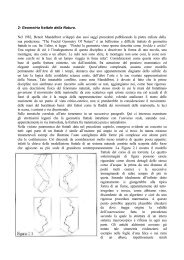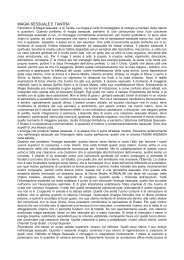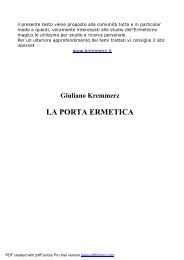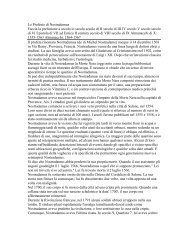Yale University Press NEW HAVEN & 9 780300"089028 - Sito Mistero
Yale University Press NEW HAVEN & 9 780300"089028 - Sito Mistero
Yale University Press NEW HAVEN & 9 780300"089028 - Sito Mistero
- No tags were found...
Create successful ePaper yourself
Turn your PDF publications into a flip-book with our unique Google optimized e-Paper software.
158 ~ TALIBANaround Afghanistan? After the collapse of the Soviet Union, Bridas hadfirst ventured into Western Siberia, 'But there were too many problemsthere with pipelines and taxes so we arrived in Turkmenistan when itopened up,' Bulgheroni told me in the only interview he has given onBridas's role in Afghanistan. 1 In 1991, Bridas took a huge risk when itbecame the first Western company to bid for leases in Turkmenistan. Atthe time, Western oil companies called the decision crazy. Turkmenistanwas distant, landlocked and had passed no legislation to protect foreigninvestors. 'Other oil companies shied away from Turkmenistan becausethey thought it a gas place and had no idea where to market it,' saidBulgheroni. 'Our experience in discovering gas and transporting itthrough cross-border pipelines to multiple markets in Latin America convincedme that the same could be done in Turkenistan.' President Niyazovwas flattered by the attention Bulgheroni paid him, when no otherWestern oil executive even appeared at his door, and the two men struckup a warm friendship.In January 1992, Bridas was awarded the Yashlar block in easternTurkmenistan close to the Afghan border and north-east of the massiveDaulatabad gas field discovered by the Soviets. A year later, in February1993, Bridas was awarded the Keimir block in the west of the countrynear the Caspian Sea. As the first and only entrant to Turkmenistan,Bridas received favourable terms - a 50-50 split in profits in Yashlarand a 75-25 split in profits in Bridas's favour in Keimir. 'We wantedto develop new oil and gas deposits because then Russia could notobject to new finds as they would if we just developed old Soviet erafields,' said Bulgerhoni.Bridas invested some US$400 million in exploring its leases - a staggeringsum in those early days for a small oil company, when not even theoil majors were involved in Central Asia. Bridas began to export oil fromits Keimir field in 1994, with production rising to 16,800 b/d. Then inJuly 1995, in the hot, arid Karakum desert, Bridas struck gold - a massivenew gas field at Yashlar with estimated reserves of 27 tcf, more thandouble Pakistan's total gas reserves. 'Unlike oil, gas needs an immediate,accessible market, so we set about devising one,' said Jose Louis Sureda,Bridas's gas transportation manager - a tough, stout engineer who was tocriss-cross Afghanistan in the months ahead surveying possible routes. 2'After discovering Yashlar we wanted part of the gas to go northrough old Russian pipelines, but we wanted to find alternative marketand these were either China or South Asia,' said Bulgheroni. 'A pipelinethrough Afghanistan could become a peace-making business - difficultbut possible,' he added. In November 1994, just as the Taliban capturedKandahar, Bulgheroni persuaded Niyazov to set up a working group tostudy the feasibility of a gas pipeline through Afghanistan to Pakistan.ROMANCING THE TALIBAN 1 159Four months later he had persuaded Pakistan's Prime Minister BenazirBhutto to join forces with Niyazov. On 16 March 1995 Pakistan andTurkmenistan signed a memorandum allowing Bridas to prepare a prefeasibilitystudy of the proposed pipeline. 'This pipeline will be Pakistan'sgateway to Central Asia, it will open up huge possibilities,' Bhutto's husbandAsif Zardari told me. Zardari said the Taliban's control of the pipelineroute made the pipeline viable. Behind the desk in his office, Zardarihad a huge map of the route, which he proudly pointed to. 3By now, the Pakistani military and the ISI were backing the Talibanto open up a southern transportation route via Kandahar and Herat toTurkmenistan. At the same time, Pakistan was also negotiating withQatar and Iran to obtain gas supplies through two separate pipelines, butin geo-strategic terms, with Islamabad's abiding interests in Afghanistanand Central Asia, the Bridas proposal offered the greatest opportunities. 4Bridas proposed building an 875-mile-long pipeline from its Yashlarfield, crossing southern Afghanistan to Sui in Baluchistan province, wherePakistan's gas reserves and pipeline network originates. The pipelinecould later be extended to the even bigger market of India via Multan.Bridas proposed an open-access pipeline so that other companies andcountries could eventually feed their own gas into it. This was particularlyappealing to the Afghan warlords as Afghanistan had gas fields in thenorth, which once supplied Uzbekistan but had been shut down. Bulgheroniarrived to woo the Afghan warlords. 'I met with all the leaders,Ismael Khan in Herat, Burhanuddin Rabbani and Masud in Kabul,Dostum in Mazar and the Taliban in Kandahar. I was very well receivedeverywhere because the Afghans understood they needed to rebuild thecountry and they needed foreign investment,' said Bulgheroni.By February 1996 Bulghreoni reported to Bhutto and Niyazov that'agreements have been reached and signed with the warlords which assureus a right of way'. 5 That month, Bulgheroni signed a 30-year agreementwith the Afghan government, then headed by President BurhanuddinRabbani, for the construction and operation of a gas pipeline by Bridasand an international consortium which it would create. Bridas openednegotiations with other oil companies including Unocal, the 12th largestoil company in the USA which had considerable experience in Asia andhad been involved in Pakistan since 1976. Turkmen officials had metwith Unocal for the first time in Houston in April 1995, on an invitationfrom Bridas, and a Unocal delegation had visited Ashkhabad and Islamabadapparently to discuss joining Bridas to build the pipeline.But Bridas was now facing major problems in Turkmenistan. Niyazovhad been convinced by his advisers that Bridas was exploiting Turkmenistanand in September 1994 the government blocked oil exports fromKeimir and demanded a renegotiation of its contract with Bridas. By
















